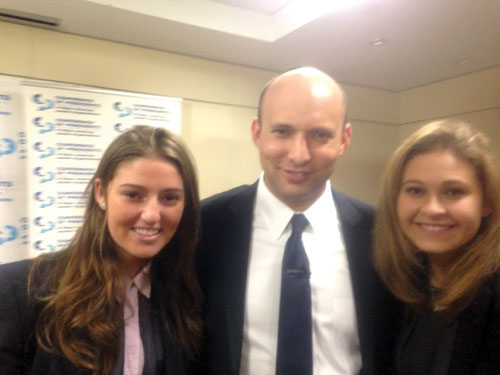.jpg)
Paramus—On Tuesday morning, November 19, Hannah Swieca and I made our way to Manhattan to hear Mr. Naftali Bennett, Israel’s Minister of the Economy, Religious Services and Jerusalem and Diaspora Affairs, speak about his hopes for Israel’s future at a meeting of the Council of Presidents of Major Jewish American Organizations. Hannah and I are in our senior year at The Frisch School, in Paramus, New Jersey. We live in Manhattan and Teaneck respectively. Last week, our school was allotted two slots to attend the 8:30 a.m. conference and we were very fortunate to be chosen for this opportunity.
At the meeting, Mr. Bennett revealed his dream for Israel. It was simple, it was clear. He said: “The Arab spring morphed into a Muslim winter, and the only thing that is clear is that nothing is clear. I see Israel as a lighthouse in a storm.” Mr. Bennett’s work on behalf of Israel is focused on this main idea.
As leader of the Habayit Hayehudi party in the Knesset, as well as holding the aforementioned roles in the government, Mr. Bennett spoke of Israel’s united effort to define a productive Israeli society outside the confines of the Middle-East conflict. Specifically, he discussed opening the economy and integrating Haredim into the workforce by repealing the rule requiring Haredim to serve in the army before working. To promote these pursuits, the government plans to subsidize the education to teach Haredim professions and skills with the long-term goal of integrating them into military service. Mr. Bennett believes that economic sanctions are the solution for those who refuse military service. In addition, he hopes to integrate Arab women into the work force by providing incentives to companies to hire them.
Israel works toward progress. And yet, threats of nuclear attacks from Iran hinder its development. For the last two decades, Iran has been enriching uranium. At this very moment, they have the potential to produce a bomb every 6 weeks. Yet, they are smart not to cross the red line. Crippling economic sanctions have been imposed…the whole world is looking at them right now. “That’s why they don’t make their move now. They don’t want break out today, they want to break out tomorrow.” They are waiting for their opportune moment when the world is busy with a crisis. Only a deal that forces Iran to dismantle the entire uranium-enriching machine is a good deal. One that merely makes them shut off the faucet or even drain their pool of uranium does not ensure Israel’s safety. This is why Mr. Bennett believes that we cannot ease sanctions now. “There is no inalienable right to enrich uranium,” he joked.
This is Israel’s future: A nation, full of bright minds, living in a homeland of 3,800 years, productively contributing to society in an otherwise volatile region. It is our job to ensure that Israel has that opportunity.
Hannah and I were invited to attend the meeting of the Council of Presidents of Major Jewish American Organizations as part of an expanded “Israel Education in the 21st Century” Program for which Frisch is a pilot school. Yeshiva University will be sponsoring a module on Israel Education in the 21st Century by using some of the most current materials and resources available in the field. At Frisch, we have an expanded unit on the history of Modern Israel that is taught to all of the seniors, weekly speakers from the community that address the entire school on a wide range of topics including Israel, and our entire senior grade travels to Capitol Hill each spring to meet with members of the House and Senate. We will be planning an Israel Advocacy Conference with Jerusalem Online University and Stand With Us.
Mindy Stein, past President of Emunah of America and founder of Be Counted4Israel, saw the need for the leadership to find more opportunities to actively involve the next generation. She asked Malcolm Hoenlein about inviting schools to send representatives to meetings at the Conference. Hannah Swieca noted that “This is a great way to expose the next generation of potential leaders to the importance of continuing Israel advocacy.”
It is vital that the future Jewish community is educated on Israeli affairs. Hannah and I were very inspired by this event to initiate unity between students from all different schools to coordinate efforts to act on behalf of the State of Israel. This demonstrates the significance of maintaining a strong connection between America and Israel. It reinforces the importance of Americans to be active supporters of Israel.
By Ariela Rivkin, Frisch ’14









